MURDER AD-LIB — Interviews by Ellen Nehr:
EDITH PARGETER (ELLIS PETERS), Summer 1991.
EN: When you wrote the first Brother Cadfael mystery, did you plan on making it a series?
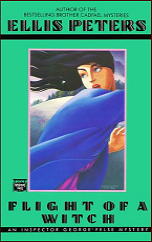
EP: Not at all. In fact, the first one was written in a slightly different style, a little lighter, and was conceived as a one off. I hadn’t intended for it go ahead. Indeed I wrote one modern tale between the first and second Brother Cadfael novels, but that’s the last time I’ve been back from the 12th Century.
EN: Will you ever do another Inspector Felse?
EP: I’d like to in a way, but somehow this series has gotten into a rhythm and keeps flowing, so it carries me from one book to the next, and it would be difficult to break the chain. Maybe some day I will.
EN: When you started the Inspector Felse series, you and Michael Innes were the only two who mentioned the home life and family of the officer. What kind of research into police practice did you have to do?
EP: I had to research into police procedures to some extent, but I must confess I was more interested in the family relations and the police officer’s relationships with the people be encounters in the case, which sometimes become personal in a way, and make the whole thing more interesting, I think.
EN: You have used archaeology in some quite unexpected places. Was this deliberate?
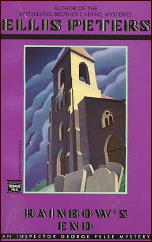
EP: Not really. I suppose that I was just interested, and it became a natural thing to make use of it. There’s the one about the Roman Site (
The City of Gold and Shadows) that isn’t a photocopy of but certainly is based on Uriconium.
That’s very close, about three miles, from Shrewsb1ry where there was a ford of the river on a Roman road. We have quite a bit of an ancient city there, which suggested the site of the book.
EN: Could the water have come up and been doing the damage to the bank that disclosed the heating pipes?
EP: Yes, it could, because it is right on the Severn River, and in a flood time it certainly could. Even the inn which I’ve described there is suggested by one just a bit down the river from there.
EN: Have you always lived in that area?
EP: Yes. Within about three miles of where I live now, apart from traveling, of course.
EN: Do you speak Welsh?
EP: No, very little. Quite a lot of Welsh don’t speak it, I’m afraid. It is being taught more again, especial]y in the south, the parts that became industrialized. Welsh is less spoken than it used to be. My grandmother spoke it, but I never learned it properly.
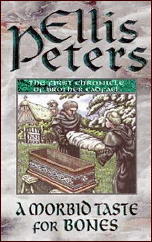
EN: If you had been brought up in another part of Great Britain, how different do you suppose your books would have been?
EP: I think they would have been affected by my surroundings. My writing is extremely visual. It is definitely based on where I am, since I’m describing pictures I can see in my own mind from around me.
EN: Over a period of time have you accumulated an extensive reference library?
EP: Yes, I have quite a big library because if there is a book that I want to use, I like to have it in the house to go back to. Usually, since I was born here, I’ve accumulated knowledge about the region, being interested in history. A lot of it has been historical and archaeological interest.
EN: Now that you are a well-known resident of Shrewsbury, do you find that people are bringing to your attention things that you might have had to research on your own?
EP: Yes, indeed they are. One expert actually came with his own wife to visit me and taught me to make fire. He brought flint, steel, and all the makings, and he left me flints and tinder, although charred cloth would catch.
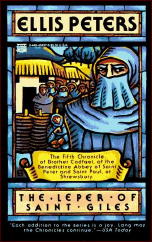
EN: In The Heretic’s Apprentice you described just how parchment was made. I was fascinated.
EP: Well, I got that out of a history of illuminated manuscripts. Some of the descriptions of the book and the timing of the book came from the same history. There isn’t such a gift book as I’ve described, but that wedding did take place, and the people were real; the Prince from the western empire and Princess from the East did marry that year, and there could have been a present such as that.
EN: I just finished your new book, The Summer of the Danes, and wondered why the Danes lived in Ireland.
EP: They had a small kingdom in Dublin, on and off. Sometimes they lost it; sometimes they got it back again. This all happened over a matter of a hundred years or so. They left a lot of their progeny there, and there was quite a bit of intermarriage. It’s mentioned in the book that 0wain’ s grandmother was a Danish princess.
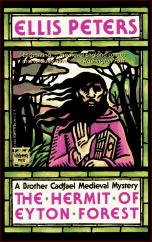
EN: How and when did the war between King Stephen and Queen Maud finally get settled?
EP: I hope the books may even reach that point. Everyone was exhausted with the war and fed up with it, and from the point that I’ve reached, action actually began to slacken off very much. Each side was just holding on to what it had, and eventually Stephen’s eldest son, whom he hoped would succeed him, died. That left the way rather clearer, and a lot of his own supporters began to think, “We’ve got to settle this somehow.”
Eventually an agreement was made that Maud’s son, who became the young Henry II, should succeed to the throne, but only when Stephen died. From that time on, there was peace, but Henry II had quite a bit clearing up to do. Stephen died in 1154, and that is ten years further on from where we are now.
EN: When you finish the 12th century books that we are reading in the 20th century and know who did it and why, do you, in your mind, interpret justice as it was then in their context of right or wrong, or as the way we perceive it today?
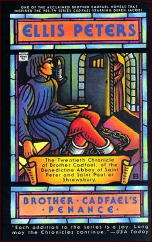
EP: Well, this I think is essentially the difference between secular sense of justice and the law; between the law and justice in fact and justice tempered with mercy. The Church had the privilege of tempering the secular justice, but I don’t say they did it often, by any means.
Cadfael doesn’t take the law’s exact point of view. He makes up his own mind on what is for the best, as he did in one case where he let a murderer go away, but having laid on him the penance of remembering life long and acting differently.
So he got his own way. It’s not secular justice, and it’s a theme I’ve taken up in other books, the conflict between the human sense of justice and what’s dictated by the law. It’s a big question.
EN: Are you a Roman Catholic?
EP: No, I’m an Anglican, but then we were all Roman Catholics, so I’ve tried to project myself.
EN: What do the Benedictines think of the books?
EP: I have quite a number of Benedictine correspondents and even a lot of clerics and a lot of historians, and on the whole, they very much approve. And they approve of what you’ve touched on, this sense of human compassion coming into the question of justice. They’ve been a great help to me, and they’ve given me great encouragement.
— Reprinted from Mystery*File 31,
September 1991.
[UPDATE] 06-23-12. Ellis Peters wrote 13 books in her Inspector Felse series; the last one appeared in 1978. She also wrote 20 books in which Brother Cadfael appeared, two of them after this interview took place. Both she and and my good friend Ellen Nehr died in 1995.






June 24th, 2012 at 6:10 am
This is a very interesting interview. But it is a pity that Ellen Nehr did not ask Peters about her musical interests. Peters used her extensive musical training to write more “music and crime”-novels than any other mystery writer.
June 24th, 2012 at 10:00 am
Josef
That’s an interesting aspect of her books I was unaware of, most likely because I’ve read so few of them. I never put two and two together, even though I’ve read more in the Felse series than I have the Cadfael books.
I may be wrong about this, but I’m assuming music plays a role in the Felse novels? They seem to be traditional mysteries in one way, but the ones I’ve read have gone off in unexpected tangents in another, making them doubly enjoyable.
You included Black Is The Colour of My True-Love’s Heart (1967), one of the Felse books, in your recent list of favorite music-and-crime mysteries: https://mysteryfile.com/blog/?p=17669. Which others might you recommend, for those of us who have been slow to catch up to them?
— Steve
June 25th, 2012 at 3:20 am
Steve
I would like to recommend “Mourning Raga”, a Felse novel, and two non-series novels “Funeral of Figaro” and “The Will and the Deed”.
February 23rd, 2013 at 1:58 am
Thank you so very much for posting this webpage and for updating it. I read the Brother Cadfael mysteries in the early 1990’s, then I put them away because I had a lot of nonfiction Catholic reading to catch up on. Reading all of the Brother Cadfael mysteries helped to bring me back to the Church. Now I am dealing with cancer, and along with my non-fiction reading, I want to pick up Brother Cadfael again. May Ellis Peters rest in peace. She did her part in helping to make this world a better place.
December 10th, 2022 at 7:59 pm
Thank you very much for publishing this interview. I stumbled upon Ellis Peters as a fan of Medieval English History and love the quality of Peter’s writing. I’m currently reading book 17 of the Cadfael series but will continue reading her other books.
Thank you
Norman Penick
Hilo Hawai’i